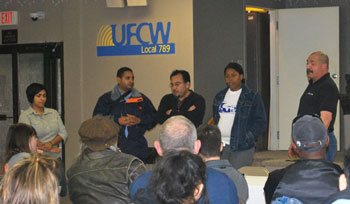

Vol. 74/No. 15 April 19, 2010

|
| Militant/Diana Newberry |
| Delegation from Cuban Federation of University Students (FEU) talks with meat packers and others March 29 at United Food and Commercial Workers Local 789 hall. From left to right: Veronica Mendez, translator, Workers Interfaith Network; Aníbal Ramos Socarrás, FEU; Francisco Segovia, translator, Minnesota Immigrant Rights Coalition (MIRAc); Yenaivis Fuentes Ascencio, FEU; and David Vásquez, Local 789 shop steward. |
They gave presentations at a reception upon their arrival here March 27 and at well-attended meetings at the University of Minnesota (U of M) and Minneapolis Community Technical College (MCTC), and at a meeting of meat packers and others during their three-day visit.
The two Cuban students are on a monthlong speaking tour to campuses across the United States. The speaking engagements are sponsored by a broad range of academic departments, professors, and student groups.
More than 125 people came to hear the Cuban youth at a meeting at MCTC chaired by Spanish professor Darren Witwer, and sponsored by Chicanos Latinos Unidos, the United Nations of Indian Tribes for Education, and the French Club, among others. The meeting was translated into sign language for students with hearing impairment.
At the meeting Ramos described the ceaseless campaign of sabotage and destabilization carried out by Washington since the triumph of the Cuban Revolution over the Batista dictatorship in 1959. When the dictator, his henchmen, and the wealthy Cuban capitalists who supported him fled Cuba, “all of them were given political asylum in the United States,” Ramos explained. The U.S. government began the embargo on Cuba—a policy that aimed “to drown and suffocate the revolution.”
A student asked whether the current U.S. administration has changed relations with Cuba. “The Obama administration has eased some restrictions on travel and remittances by Cuban Americans,” said Fuentes. The visas she and Ramos received signaled that there could be more academic and cultural exchanges. “But the blockade imposed on us for 50 years remains, and those in the United States who have no relatives in Cuba cannot visit the island,” she said.
Fight against racial discrimination
At the MCTC meeting, one person said Cubans who are black faced higher unemployment and incarceration rates in Cuba, and asked how the Cuban youth would explain this. “This is a problem that the Cuban people have taken on,” Ramos answered, “but it was not created by the revolution. It is the legacy of centuries of colonialism. We are mestizo and black in our majority and have always felt an obligation to eradicate this legacy of oppression.
“The Cuban Revolution has fought for 50 years to improve this situation,” he said. “Our policy is not to ignore these problems, it has always been the opposite—to fight to minimize them.”
Fuentes and Ramos spoke at two meetings at the University of Minnesota—one organized by the Students’ International Health Committee (SIHC) and attended by 70 people, most of them medical students; the other, a meeting of 110 people sponsored by the African Student Association and the Institute of Global Studies.
A lively discussion and debate followed presentations by Fuentes and Ramos at the lunch hour meeting at the medical school.
“Before the triumph of the revolution in 1959 health care was not a right,” and the working-class majority received no medical care because they couldn’t afford it, Fuentes explained. “Today health care is a right for the whole population.”
Many students raised their hands in the discussion. One asked, “What can we in the United States do to work with Cuba to improve health care?”
“We are open to working together,” Ramos replied, “but the U.S. embargo on Cuba has impaired our ability to have any real interchange.”
“To transform health care,” he continued, “it is necessary to revolutionize class relations, and the only way to do that is with a social revolution, a socialist revolution.”
A debate broke out in the pages of the Minnesota Daily, the University of Minnesota newspaper, when a letter to the editor from Kyle Edwards, one of the tour supporters, titled “Cuba is not the enemy; ignorance is,” was published at the beginning of the tour. Edwards wrote, “Cuba shines as an alternative to capitalism, where wealth concentrates in a few hands and the repercussions are still being felt in our economy, especially with imperialist ventures such as Iraq.” He encouraged students to attend the Cuban youth meetings.
The next day U of M medical student Scott Deeney replied in a letter titled “Response to ‘Cuba is not the enemy’: Cuba and its ‘free health care’ are failed communist projects.” Deeney wrote, “The Cuban people have traded freedom for free health care.”
Exchange with union meat packers
Ramos and Fuentes were well received by 40 meat packers and others at the United Food and Commercial Workers Local 789 union hall. Jennifer Christiansen, Local 789 secretary-treasurer, welcomed them to the gathering. Those present included 17 kill floor workers from Dakota Premium Foods, a beef slaughterhouse in South St. Paul.
Over hot dogs and potato chips the workers asked the Cuban youth questions. Thomas Mitchell, a kill floor worker, asked whether workers get paid sick days in Cuba, pointing out that many in the United States, including those at Dakota, get none.
Ramos replied that in Cuba workers “don’t lose their job for being sick, and are paid 60 percent of their wages.”
Many at the meeting learned for the first time about the case of the Cuban Five, the frame-up of five revolutionaries who kept the Cuban government informed about counterrevolutionary groups planning attacks against Cuba. “The Cuban Five have been in U.S. prisons now for 11 years. We believe the only way they will return to Cuba is if people in this country organize to demand their freedom,” Ramos said.
Related articles:
Cuban students meet Wisconsin dairy farmers
Front page (for this issue) |
Home |
Text-version home